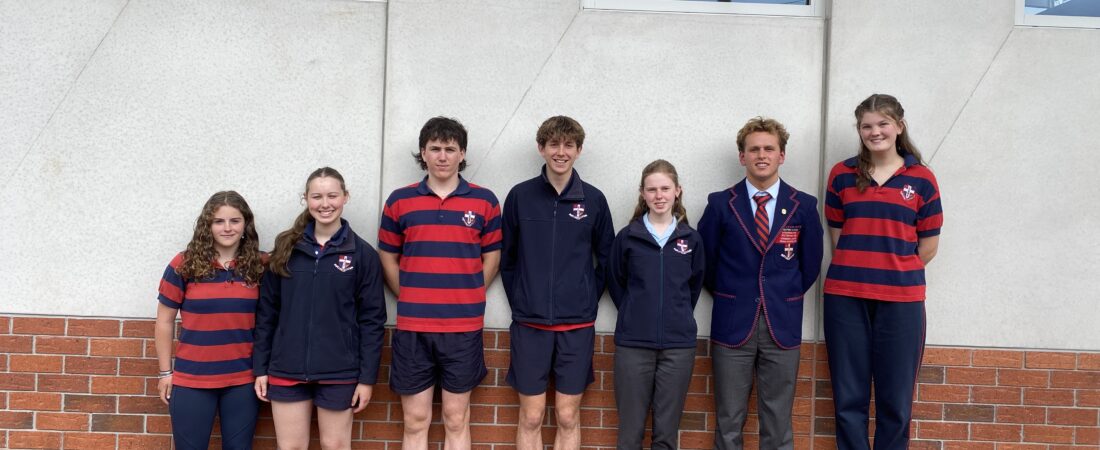Mary Stanfield Public Speaking Competition 2023
Posted on November 2, 2023
The Mary Stanfield Public Speaking Competition was held at the beginning of Term 4 (Monday 23 October 2023). The Student Chairperson introduced the Prize by introducing former alumna / staff member, Mark Nicholson, as a guest Judge, and the topic; ‘’The defining issue of our time…’’ to which the six shortlisted student candidates spoke for approximately five minutes each.
The first speaker, Anneka Lewis, focussed on the subject of happiness and connection and the importance of personal solutions and seizing the day. Anneka implored her audience to not be ‘scared of failure, standing out, making mistakes … or overlooking the here, the now.’ She asked; ‘What makes you the happiest?’ with a view to encouraging the audience to ‘push away the boundaries, put down their phones, forget the plan’ in realisation that ‘the moment is now.’
Anneka was followed by Lillian Malone, Noah Haas and Andrew Cooper who variously grappled with the pressing issue of the environment and climate change: considering the actions that need to be behind our words, the personal nature of our choices, and the importance of action rather than inaction.
Lillian defined the issue as that of the environment, and specifically protecting it. We heard about the importance of considering the impact of the natural environment on our health, in the context of fossil fuel consumption, declarations about emissions and the global impacts of climate change. To conclude, Lillian asked her audience to consider the importance of the natural beauty of the environment, and to take action in the form of not just legislation and global agreements, but in an appreciation of nature at a local level.
In defining the issue, Noah Haas led the audience to realise that we would be overlooking many other deserving concerns such as the impact of social media or the impact of conflicts on people. He was, however, in agreement with the second speaker that Climate Change is the defining issue of our time as it is ‘global in scope and unprecedented in scale’. Framing his consideration of the topic in terms of evidence of extinction, the loss of biodiversity and the growth of climate induced migration, Noah asked his audience to not ‘become overwhelmed’ and to ‘recognise the positive changes in energy production and green initiatives. He concluded by connecting us to the history of humanity with a Quaker lens, with the statement: “the society we live in is not reflective of our circumstances, but our actions”.
Fourth speaker, Andrew Cooper engaged the audience with a slightly different approach in a conversation about the impact of plastics, and in particular microplastics, as it has converged across various spheres of society: environmental, economic and so forth. His logical contention was that the economic costs of cleaning up the impact of microplastics was grossly underwhelming, making his appeals regarding “our actions today will determine the quality of life of our children” and “the time is now to act” highly impactful.
Fifth speaker and Runner-Up, Isabel Adams, challenged the audience to consider ‘impactful ally-ship’ in a strong clear voice with excellent pacing, surprising the audience with her focus on how education for girls can make the difference to the impact our population makes on our planet, in a deeply connected world. Without palm cards, Isabel made excellent use of presence and gestures to invite the audience to not ‘risk losing sight of our humanity’ and to ‘channel our passion into action as impactful ally-ship.” She proceeded to impart that ‘we are more than just the things we care about’ and we should not ‘ignore the complexities of the world we live in.’ Continuing with the theme of Climate Change as defining the issue, Isabel identified that ‘in defining it as such we are losing sight of the scope of the issue’. The twist came with the invitation to use the issue to confront the social economical inequalities that lead to impacts on populations, including the impacts on gender bias. Specifically, Isabel identified that the issue is inexplicably linked to funding improved education for girls as a solution: we should be redefining the issue as an approach to solving it.
To conclude, this year’s Winner, Samuel Castle, took an interesting and personal approach for the audience, suggesting that the real issue is humans are destroying humanity, with a call to action that suggested if ‘the buck stops with us’, then we are the ‘buck’. The audience were accordingly gripped by his emphatic delivery, strong gestures and topical examples across issues such as environmental destruction, vaping, and the impacts of multinational corporations, before Sam identified that it was ‘humans destroying humanity’; “we are the defining issue of our time”. He went on to conclude that we are the last generation that can make a change before humanity wipes itself out by 2096, and rallied the audience in a call to action: “Let’s change. Let’s make the change that they couldn’t… [let’s] write about the defining change that we made to save our time.”
